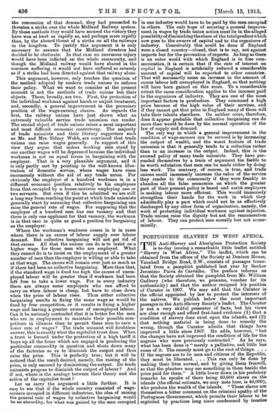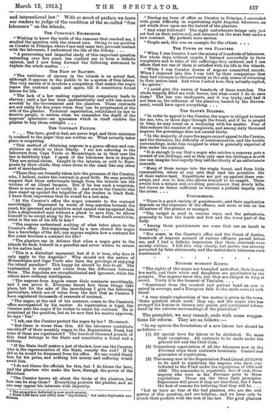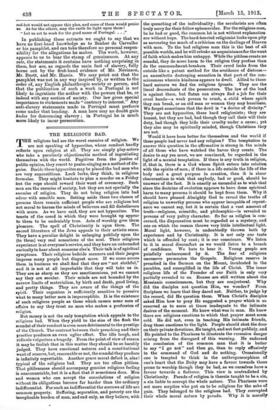PORTUGUESE SLAVERY IN WEST AFRICA. T HE Anti-Slavery and Aborigines Protection
Society is to-day issuing a remarkable little leaflet entitled " Slavery in West Africa." The leaflet, which can be obtained from the offices of the Society at Denison House, Vauxhall Bridge Road, S.W., consists of passages trans- lated from a pamphlet published last year by Senhor Jeronimo Paiva de Carvalho. The preface informs us that the Society obtained the pamphlet from Mr. William Cadbury (who therefore, we presume, vouches for its authenticity) and that the author resigned his position of Curator in 1907. We may add that the Curator is the official appointed by law to protect the interests of the natives. We publish below the most important passages in the Anti-Slavery Society's leaflet. The Curator is not a very skilful presenter of facts, but his views are clear enough and afford first-hand evidence (1) that a condition of slavery does exist upon the islands, and (2) that nothing material is being done to remedy the wrong, though the Curator admits that things have improved a little since 1907. He adds, however, " but the changes have not improved the condition of life for the negroes who were previously contracted." As ho says, what has been done is " merely a palliative, and little has come of it. The remedy must go to the root of things. . . . If the negroes are to be mon and citizens of the Republic, they must be liberated. . . . This can only be done by making their lives normal, and by giving them freewill, so that the planters may see something in them beside the price paid for them." A little lower down in his prefatory remarks he speaks of there being 60,000 slaves on the islands (the official estimate, we may note here, is 40,000), who produce the wealth of the islands. " These slaves are themselves a bitter comment on the criminal apathy of the Portuguese Government, which permits their labour to be exploited by practices long since condemned by treaties and international law." With so much of preface we leave our• readers to judge of the condition of the so-called "free labourers " on the islands.
THE CURATOR'S EXPERIENCE.
" Wishing to know the truth of the rumours that reached me, I studied the question with the utmost care. Owing to my position as Curator in Principe, where I saw and came into personal contact with the labourers, I understood the life of the Colony. . . .
" A persevering and impartial study of this important question extending over five years has enabled me to form a definite opinion, and I now bring forward the following statement to explain the whole matter. . . .
THE FACT OF SLAVERY.
"The existence of slavery in the islands is an actual fact, although it appears to the public to be a system of free labour. The very nature of it involves a compulsion that makes the negro renew the contract again and again, till it constitutes forced labour for life.
"The lack of a law making repatriation compulsory leads to slavery; such a law has been systematically and with one accord averted by the Government and the planters. These contracts are not really for five years when they can be perpetuated at the will of the planter. Technical repatriation, established by law to deceive people, is useless when we remember the depth of the negroes' ignorance—an ignorance which in itself enables the planter to buy them outright. . . .
THE CONTRACT FICTION.
" . . . The laws, good or bad, are never kept, and their existence is confined to the paper they are written on. What actually takes place is surprising.
"This method of obtaining negroes is a grave offence and con- stitutes an attack on their liberty. I am not referring to the labourers from Cape Verde or Mozambique, as in their case the law is faithfully kept. I speak of the labourers born in Angola. They are actual slaves. Caught in the interior, or sold to Euro- peans by their chiefs, they come down to the coast like any other sort of merchandise.
"There they are formally taken into the presence of the Curator, who, I believe, makes the contract in good faith. He may possibly suspect that these unfortunate beings from the interior are the victims of an illegal bargain. But if be has such a suspicion, there is never any proof to verify it. And woe to the Curator who dare stand up against the iniquities of the traders in black flesh.
I know from experience that he would be a lost man.
"At the Curator's office the negro consents to the contract unwittingly. Depressed by weeks of long marches towards the coast, his ignorant and primitive mind cannot rise up against fate. Like a shipwrecked man without a plank to save him, he allows himself to be swept along by the waves. When death awaits him, what is the nse of his life to him ?
"The negroes understand nothing of what takes place in the Curator's office. But supposing that by a rare chance the negro has a knowledge of the Act, can anyone explain how a contract for five years becomes a contract for life ?
" The planters say in defence that when a negro gets to the islands he finds himself in a paradise and never wishes to return to his native land.
"This is a diabolical argument, but if it is true, why does it only apply to the Angolan ? Why should not the native of Mozambique and Cape Verde also have the privilege of enjoying the island paradise ? This happy lot should be free to all. The explanation is simple and comes from the difference between them. The Angolans are unsophisticated and ignorant, while the others have ordinary intelligence.
"The negroes from Angola renew their contracts unwittingly, and I can prove it. Everyone knows how these things take place, but for the sake of the incredulous I give the following particulars, which are of value from the fact that as Curator I have registered thousands of renewals of contract.
"The negro, at the end of his contract, comes to the Curator's office accompanied by his master. As repatriation is legal, the Curator asks the negro if ho wishes to renew his contract. He is surprised at the question, but as he sees that his master approves, he says Yes.'
"I ask, can the Curator protect the negro by law ? He cannot.
" But there is worse than this. All the labourers contribute one-third* of their monthly wages to the Repatriation Fund, but none of them are repatriated.t The hundred thousand pounds of this fund belongs to the State and constitutes a fraud and a robbery.
"If the State itself makes a jest of the law, how can the Curator, who is the representative of the State, remedy the evil? If he did so he would be dismissed from his office. No one would thank him for his pains, and nothing but misery and suffering would await him.
"I do not blame the officials for this, but I do blame the laws, and the planters who make the laws, through the power of the Ministers.
"The Curator knows all about the tricks of the planters, but how can he stop them ? Everything protects the planter, and no ono may oppose his interests with impunity.
• The pro rtion deducted is now much greater. t Some 2, ditioss. have now (1913) been "repatriated," but under deplorable con- " During my term of office as Curator in Principe, I succeeded with great difficulty in repatriating eight Angolan labourers, an act which drew upon me the hatred of the planters.
"And what followed ? The eight unfortunate beings only just set foot on their native soil, and returned on the next boat under a new contract. My protests wore useless.
"People said, this was an example for the others. . .
THE POWER OF THE PLANTERS.
" When I was Curator I saw the misery of hundreds of labourers. For whole days, without respite, I listened sorrowfully to their complaints and to tales of the sufferings they endured, and I can affirm that not one of them is satisfied with his life in the islands.
" While I was Curator dozens of negroes committed suicide. When I inquired into this I was told by their companions that they had recourse to this extremity as the only means of returning to their native land. And when I asked how, they actually replied,
spirits.'
" I could give the names of hundreds of these wretches. The whole tragedy filled me with horror, but what could I do to save them? The law was inadequate, and it was tricky, and had it not been so, the influence of the planters, backed by the Govern- ment, would have upset everything...
THE SLAVE'S DILEMMA.
"In order to appeal to the Curator, the negro is obliged to travel for one, two, or three days through the forest, and if he is caught in time, he may count on a reckoning with his master. Fear of this reduces the number of complaints, and among sixty thousand negroes the percentage does not exceed thirty.
"In the majority of eases the negro cannot appeal to the Curator, and the distances, the difficulty of communication, and the hostile surroundings, make him resigned to what is generally expected of him under the contract.
"It is enough to say that a negro who catches a runaway gets a reward of six shillings, and as they only earn ten shillings a month one can imagine how eagerly they sell the liberty of an unfortunate comrade.
"Many of them escape into the virgin forest, and form little communities, where at any rate they lead the primitive life of their native land. Expeditions are got up against these run- aways, and woe to him who allows himself to be caught. There awaits him a unique and revolting punishment that slowly kills, but leaves no traces sufficient to warrant a judicial inquiry into the crime. . . .
PUNISHMENTS.
"There is a great variety of punishments, and their application depends on the character of the offence, and more or leas on the ill-nature of the planter or manager.
"The cudgel is used in various ways, and the palmatoria, generally to beat the hands and feet and the lower part of the body.
" Among these punishments are some that are an insult to humanity. . . .
"For years, in the Curator's office and the Court of Justice, hundreds of negroes accused of various offences passed before me, and I had a definite impression that these criminals were merely victims. I felt this very clearly, but justice was cleverly perverted by false statements, and the unfortunate labourers wore condemned.
• • •
NEGROES WITHOUT EIGHTS.
"The rights of the negro are trampled underfoot, their honour is a myth, end their wives and daughters are prostituted by the gangers. The negroes know this, but they are obliged to keep it secret. Verily it is the torment of Tantalus.. .
"Sometimes from the crushed and patient band an arm is raised in revenge, and a European falls to the earth covered with blood.
"A very simple explanation of the matter is given in the town. `Some question about work,' they say, and the negro who has avenged his honour is thrown into prison and condemned before- hand by the adverse surroundings of the plantation."
The pamphlet, we may remark, ends with some sugges. tions for reform. They are as follows :— " In my opinion the foundations of a new labour law should be as follows :—
(1) All special laws for labour to be abolished. No more legal exceptions. All contracts to be made under the general law and the Civil Code.
(2) Compulsory repatriation of all the labourers now in the Province when their contracts terminate. Control and guarantee of repatriation.
(3) The money now in the Repatriation Fund (about £120,000) to bo used to repatriate the negroes who have con- tributed to the Fund under the regulations of 1903 and 1909. The remainder to repatriate, free of cost, those negroes who were in the Province prior to those regulations. These are the three basic principles. Experience will prove if they are beneficial, but I have the best of reasons for believing that they will be. . . "Let us have no fear of the bad planters, who are the evil genius of this question, and are helpless ; and we have only to attack their pockets with the iron of the law. The good planters
red-hot would not oppose this plan, and some of them would praise us. As for the others, may the earth lie light upon them ! " Let us set to work for the good name of Portugal. . . ."
In publishing these extracts we ought to say that we have no first-band knowledge as to Senhor de Carvalho or his pamphlet, and can take therefore no personal respon- sibility for the allegations he makes. The work, however, appears to us to bear the stamp of genuineness. At any rate, the statements it contains have nothing surprising in them, but are, as regards the main fact of slavery, fully borne out by the first-hand evidence of Mr. Nevinson, Mr. Burtt, and Mr. Harris. We may point out that the pamphlet was not in any way inspired by, or written to the order of, any English philanthropic society or person, and that the publication of such a work in Portugal is not likely to ingratiate the author with the powers that be, or indeed with any section of society. Our law gives special importance to statements made " contrary to interest." Any anti-slavery statements made in Portugal must perforce come under that heading. A man here may no doubt gain kudos for denouncing slavery ; in Portugal he is much more likely to incur persecution.
















































 Previous page
Previous page